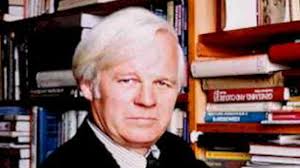Richard Lynn, Cultural Marxism, and the War on Objective Science

Richard Lynn is one of very few academics whose impact on their discipline is such that the field could scarcely be discussed without referring to him. In psychology, and particularly the study of intelligence, Lynn has carved out a dominant, innovative, and extraordinarily productive career spanning several decades. He remains prolific at age 87, and Washington Summit will soon publish what will surely be a future classic: Race Differences in Psychopathic Personality —- a volume that I have had the honor and great pleasure of editing. Lynn took his Ph.D. at the University of Cambridge and worked as lecturer in psychology at the University of Exeter, professor of psychology at the Economic and Social Research Institute, Dublin, and at the Ulster University. He has published in such journals as Nature, British Journal of Psychology, Journal of Biosocial Science, and Bulletin of the British Psychological Society, and has served on the editorial boards of Intelligence, Personality and Individual Differences, and Mankind Quarterly. On his retirement, and in recognition of his accomplishments and contributions, the title of professor emeritus was conferred on Lynn by Ulster University. During the last seven days, however, moves have been undertaken to strip Lynn of this title.
The reasons behind the move are symptomatic of the malaise hanging over much of the modern academic establishment, and are a reflection of the great unease with which this establishment has always greeted Lynn’s fearless research profile. There are few leftist sacred cows that Lynn hasn’t seen fit to hunt down. During the same decades that Cultural Marxism was extending its tentacles around the Academy, Lynn’s research argued the case for the existence of race and sex differences in intelligence, and in The Chosen People: A Study of Jewish Intelligence and Achievement (2011) Lynn crossed firmly into forbidden territory by offering an evidence-based study of the Jewish IQ. It remains the best available rebuttal to Sander Gilman’s work of Freudian apologetic pseudoscience Smart Jews: The Construction of the Image of Jewish Superior Intelligence (1996). It should be unsurprising that Lynn is also one of very few academics whose work caused a stir beyond the ivory tower. Coverage of Lynn’s work often featured in the BBC, a large number of high-circulation international newspapers and, perhaps inevitably, in the “extremist files” of the radical leftist Southern Poverty Law Center.
Lynn’s work also remains the byword for all that the Left hates about objective science. An excellent example is a recent Guardian article by the London-born ethnic Indian Angela Saini. In this article, titled ‘Racism is creeping back into mainstream science — we have to stop it,’ Saini (who is a journalist, does not hold a PhD in any scientific discipline, and has not published in any peer-reviewed journals) reported on an annual conference held at University College London by “race scientists and eugenicists.” Saini warns “Researchers with extreme views on race number relatively few but, having languished on the margins of their fields for many years, they are now managing to push their ideas into the mainstream, including into respectable scientific journals.”
 It goes without saying that Saini doesn’t share this view, and that she is quite disturbed by research showing hierarchies in race and sex. It’s really quite ironic given that Saini is herself a producer of ethnocentric pseudoscience. Her first book, Geek Nation: How Indian Science is Taking Over the World (2011), is a risible and miserable text which argues that India was destined to be a scientific superpower but was held back by “invasion, colonisation, famine, and partition” which “all but stripped the nation of its scientific legacy.” The White male is Saini’s ‘folk devil,’ and one can imagine that Richard Lynn represents more than a scientist to her. I note that Saini’s article makes a brief, telling, reference to the description of Pakistan by race scientists as a “low IQ country,” though she was unable bring herself to mention that India ranks even lower (although there is much variation, and Indian immigrants to the US are a particularly talented group).
It goes without saying that Saini doesn’t share this view, and that she is quite disturbed by research showing hierarchies in race and sex. It’s really quite ironic given that Saini is herself a producer of ethnocentric pseudoscience. Her first book, Geek Nation: How Indian Science is Taking Over the World (2011), is a risible and miserable text which argues that India was destined to be a scientific superpower but was held back by “invasion, colonisation, famine, and partition” which “all but stripped the nation of its scientific legacy.” The White male is Saini’s ‘folk devil,’ and one can imagine that Richard Lynn represents more than a scientist to her. I note that Saini’s article makes a brief, telling, reference to the description of Pakistan by race scientists as a “low IQ country,” though she was unable bring herself to mention that India ranks even lower (although there is much variation, and Indian immigrants to the US are a particularly talented group).
Racial hurt seeps from the page, and my own instinct suggests that Saini may well be engaged in a form of self-deception, submerging her own ethnocentrism and ethnic grievances in a swamp of superficial egalitarianism. She is currently working on a book promising to ‘debunk race science.’ This will be an interesting, if unoriginal, project given that Saini appears to be blind to the content she intends to critique. She describes the arguments that there are biological differences in intelligence between racial groups, advanced by Lynn and others, as “unsupported by evidence.” Saini is thus apparently oblivious to the copious amount of peer-reviewed, data-driven literature produced by the “well-connected cabal,” and the fact that even some of Lynn’s most determined critics could only conclude: “Our review of the literature on the performance of Africans on the Raven’s tests showed that the average IQ of Africans on the Raven’s tests is lower than the average IQ in western countries.”[1]Describing these researchers as a “well-connected cabal,” Saini highlights Lynn as a particularly successful, influential, and therefore in her eyes ‘dangerous,’ figure. Writing with an air of disbelief, Saini laments that “Lynn sits on the editorial advisory board of Personality and Individual Differences, produced by Elsevier — one of the world’s largest scientific publishers, whose titles include the highly respected journals the Lancet and Cell.”
She seems especially disquieted by Lynn’s research on the verbal IQ of Jews, and even contacted the editor-in-chief of Intelligence, Richard J Haier, an emeritus professor in the medical school at the University of California–Irvine, with a view to agitating for the removal of Lynn from that journal’s editorial board. In a rare showing of integrity from a ‘mainstream’ academic, Haier responded: “I consulted several people about this. I decided that it’s better to deal with these things with sunlight and by inclusion.…The area of the relationship between intelligence and group differences is probably the most incendiary area in the whole of psychology. And some of the people who work in that area have said incendiary things. … I have read some quotes, indirect quotes, that disturb me, but throwing people off an editorial board for expressing an opinion really kind of puts us in a dicey area. I prefer to let the papers and the data speak for themselves.”
The gulf between reality and ideology witnessed with Angela Saini, and the possession of a level of self-importance quite unsupported by achievement or experience, is equally present in the campaign to strip Richard Lynn of professor emeritus status. The Irish Times reports “The move against Professor Lynn came after the Students Union passed a motion calling for the “revocation” of his title. The student body also distanced itself from the views held by Professor Lynn and reaffirmed its commitment “to making UU a welcoming and inclusive environment for all students”. The student group believes that the positions advocated by Professor Lynn violate the university’s good relations policy. It is understood that at a meeting of the UU student council last week 29 members voted in favour of the motion while one person opposed it and there were two abstentions.… The university is expected to make a decision on whether to remove Professor Richard Lynn’s title in the near future.”
 The ringleader behind the effort appears to be Kevin McStravock, President of the Student’s Union. McStravock, a journalism graduate, has no background in science, and his work history is limited to selling men’s fashion and being a professional student. His campaign brings to mind Henry David Thoreau, who argued in Walden that college students “should not play life, or study it merely, while the community supports them at this expensive game, but earnestly live it from beginning to end.”
The ringleader behind the effort appears to be Kevin McStravock, President of the Student’s Union. McStravock, a journalism graduate, has no background in science, and his work history is limited to selling men’s fashion and being a professional student. His campaign brings to mind Henry David Thoreau, who argued in Walden that college students “should not play life, or study it merely, while the community supports them at this expensive game, but earnestly live it from beginning to end.”
If detachment from reality in academic life was acute in Thoreau’s time, it is abundantly more so today. Professional students like McStravock are indulged in the belief that they have life “figured out,” and they are similarly imbued with a misplaced confidence in their ability to hold forth on an array of issues in which they are entirely lacking in sufficient knowledge and experience. One imagines that young McStravock and his colleagues believe themselves to be ‘fighting the man’ or ‘overcoming oppression,’ despite targeting a retired academic who in 1994 endured harassment while at the university from Communists calling themselves “the Anti-Nazi League,’ as well as ostracism from colleagues, And no wonder: His work has been in perpetual defiance of the academic establishment.
The precise argument behind the effort to strip Lynn of his title deserves further attention, but it is first necessary to reflect on the apparatus for maligning rebel scholars and consigning them to the academic periphery. This process is quite straightforward. As soon as dedicated cultural marxists and/or ethnic activists assume the role of gatekeepers within a discipline (normally by occupying influential academic roles such as prestigious chairs, controlling access to funds, or managing journals) they can begin to set the tone and direction of large swathes of the discipline. Jewish activism in the social sciences and the arts is particularly instructive (e.g. academic discussion of ‘anti-Semitism’ is entirely dominated by Jews). In some instances this can be directed towards the praise or promotion of like-minded individuals or co-ethnics — the now well-documented Jewish promotion of Spinoza and Mahler are excellent case studies. In other instances, entire ‘ways of seeing’ can be dictated — the career of psychoanalysis and Boasian anthropology are good examples here. Finally, the gatekeepers acquire the power to exclude ideas and individuals deemed anathema to the status quo. Theories of anti-Semitism which do not assign unblemished victim status to Jews are included in this category, along with anyone who could remotely be described as a ‘race scientist.’ Such exclusions are normally backed outside the academic establishment via cultural means, with the mainstream media, equally beholden to gatekeepers, providing slanted commentary designed to heap further opprobrium and social ostracism on the offending scholar.
Rebel academics are thus often forced to form their own networks, journals, and conferences — the origin of what Saini hyperbolically described as a “well-connected cabal.” The truth is that those figures attending the University College London ‘eugenics conference’ were academic refugees from a far bigger and more powerful “well-connected cabal.” Once on the periphery, however, it is much easier for the academic establishment and its media cheerleaders to dismiss the work of rebel scholars as “unorthodox,” “fringe,” or “extreme.” Richard Lynn has been a primary target of such behavior, although precisely the same process can be witnessed in the case of Kevin MacDonald, Virginia Abernethy, and many others. A crucial aspect of such labelling processes is to deny the legitimacy of their research, to reduce their research to absurd simplifications, and to impart to non-academic observers the idea that such individuals are morally wrong.
A key aspect here is to remove the academic’s work from the sphere of scholarship and to place in social or moral contexts, the aim being to deny the work its objective status. In this regard, one frequently sees the work of rebel academics described as “views,” if not “extreme views,” rather than as “research,” “dissertation,” or “thesis.” The goal here is to deprive the scholar of having his scholarship judged as correct or erroneous, and to have his or her work deemed as something inherently personal, and morally reprehensible. Once the portrayal of the individual is shifted to this domain, professional rebuttal of their work becomes unnecessary, if not actively discouraged for fear of ‘giving a platform to fascism.’ Opposition at this stage switches from academic/professional to social/political, and the activities of the ‘Anti-Nazi League’ and the SPLC against Lynn, along with the student protests against Charles Murray at Middlebury and Harvard in March and September 2017, are excellent examples in this regard. Rebel scholars who manage to overcome enough of these obstacles to avoid obscurity and total vilification are necessarily viewed as threats. Richard Lynn may be counted among them.
Another tactic is to belittle an entire area of research by picking out a particularly counter-intuitive example that the public can be depended on to regard as ridiculous. A good example is J. Philippe Rushton’s claim, based on data he compiled for his classic Race, Evolution and Behavior, that average penis size varied between races in accord with the predictions of r/K theory. This claim was held up to ridicule by the likes of Richard Lewontin and other crusaders against race realism, and it is regularly presented in articles hostile to the race realist perspective. Richard Lynn’s response, as always, was to gather more data—from 113 populations. And unsurprisingly for those who keep up with this area of research, he found that indeed the data confirmed Rushton’s original claim.
Returning to Mr McStravock then, it is interesting that he explains the effort to strip Richard Lynn of his title in the following manner: “We go under the good relations policy and I think that was the key concern about the impact his views have on good relations [emphasis added].” Lynn’s several decades of research and leadership within his field are thus reduced to the status of merely personal, and morally dubious, ‘views.’ The data count for nothing. What matters is the emotional response of people like Mr McStravock responding to the data.
Much of this is quite unconscious of course, and I doubt that Mr McStravock and his colleagues even understand the widespread social and educational conditioning that occurs both within and outside academia. They don’t realize that they are pawns in the game, conditioned throughout their educational career to react with horror to such ideas. It takes more life experience than they are likely yet to possess and, as Thoreau reminds us, the community continues to support their expensive game. The incentive to continue playing the Social Justice Warrior remains too attractive.
The leadership of the university are presumably only too happy to concede to the demands of the student group. Given the time that has elapsed since Richard Lynn’s retirement, one suspects at least some staff involvement has also featured in the origins of the campaign. A spokeswoman for Ulster University said: “Professor Richard Lynn no longer works for Ulster University nor does he contribute to our research and teaching. The University reserves the right to withdraw an emeritus title after due consideration of all relevant information and notification to the retired academic of a decision reached to do so. The University has been actively considering this and a decision will be reached shortly.”
One wonders what “relevant information” the university feels necessary to consider given that Lynn’s research profile remains no more or less controversial than it did when the title of professor emeritus was bestowed on him in retirement. It seems likely, of course, that Lynn’s work will be considered less than the feelings of the academic gatekeepers and their pawns in the snowflake generation.
Those of us who believe in a truly objective pursuit of science and the necessity of the study of race differences may wish to make their feelings known to the university. It goes without saying that an attack on the status and legitimacy of Richard Lynn may be considered an act of aggression in a much broader culture war. Setting even that huge incentive aside, Richard Lynn has been, and remains, a tireless scholar, scientist, and advocate for some of the key issues of our time. This is one way in which we might express our gratitude.
Messages regarding the effort to strip Richard Lynn of professor emeritus status should be directed to Sharon Lowry at the Secretariat of the University Council: s.lowry@ulster.ac.uk
[1] Jelte M. Wicherts, Conor V. Dolan, Jerry S. Carlson, Han L.J. van der Maas,
‘Raven’s test performance of sub-Saharan Africans: Average performance, psychometric properties, and the Flynn Effect,’ Learning and Individual Differences, Vol. 20:3, (2010), pp. 135-151.





Comments are closed.